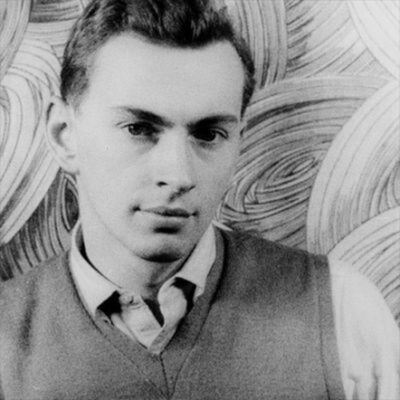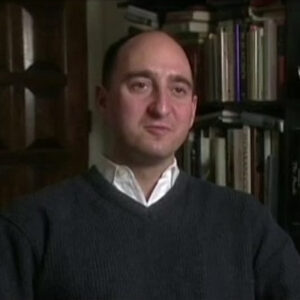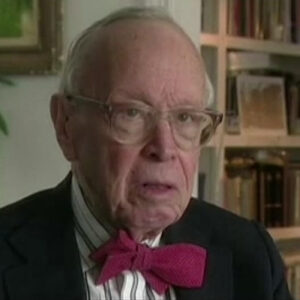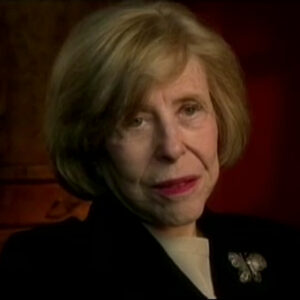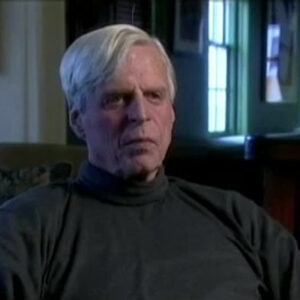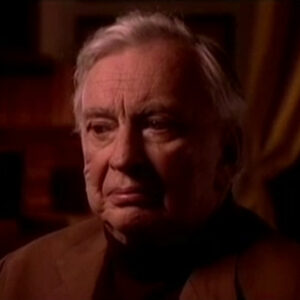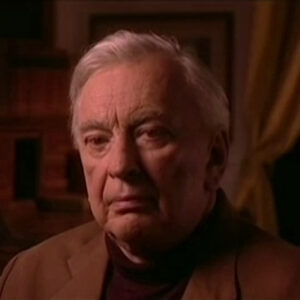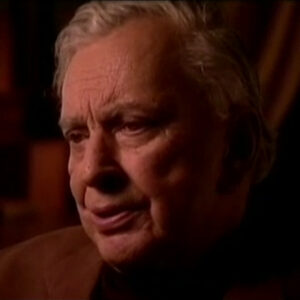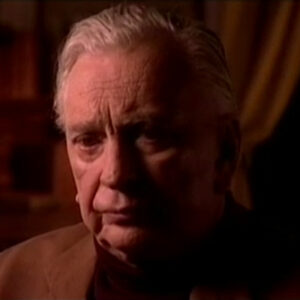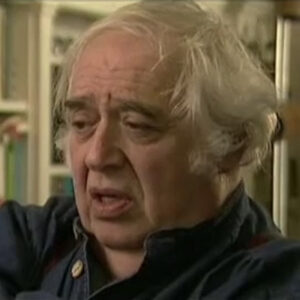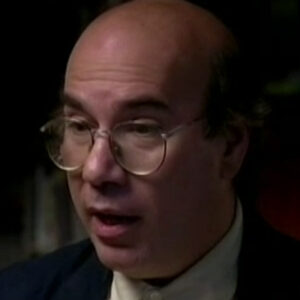Speaker What did you mean when you wrote that Gore Vidal could hardly have chosen a historical figure better suited for fiction than than Aaron Burr?
Speaker I think in a way, Arenberg sort of perfectly suited to sort of guide you through this time period in a way, because he’s sort of an outsider, but he’s an outsider with insight and he’s a sort of ironic outsider. So he’s also someone who’s sort of entertaining to travel with through this time period. So he’s a person who can sort of strip away a lot of the facade and sort of pierce the the bubble and get at what’s underneath a lot of the sort of, you know, pretense and posturing of the time period. So he’s actually the perfect person because he questions everything and he does it in sort of an amusing, wry kind of a way so that it’s actually fun. And you’re sort of shocked at yourself, I think, as you’re reading it, for going along with him going, oh, wait, he he thinks this and I’m sort of agreeing with him. So he actually, I guess, is a charming, kind of a seductively charming character who he sort of pulls you into the book and and you find yourself following along after him.
Speaker What was the either the you? Because you also wrote that the fictional first burst of bubble of historical myth and what was the sort of private and you talk about posturing just now, you can talk about.
Speaker Our founding fathers saw themselves in amber, one of the main differences, I would say, between Aaron Burr and many of the other founders is that it was a period in which everyone was so self-conscious. You know, all of the sort of political elite knew that they were creating a nation. And they also knew that they were going to be the founders capital F of this new nation. And because of that, they they were hyper worried about everything that they did and hyper worried about the sort of ideological and political implications of everything that they did. And so they everything was very complex and everything was very, very important to everyone all of the time. And in a way, Burr just took two giant steps away from that. I mean, he was interested, generally speaking, in the issues of the time. But you don’t find in his writings sort of the high philosophising of some of the other politicians. He’s really he likes the political game. He’s one of the one of only two founders I’ve ever found who actually admits that politics is fun, which is wonderful to see someone admit it. So he enjoys the game and he doesn’t ever really get wrapped up in a lot of the sort of higher political ideals, which on the one hand makes him a really useful guy to have around because he’ll do things sort of politically speaking, that others aren’t necessarily comfortable doing. But that also means he’s the sort of person you don’t necessarily trust because he’s doing things you wouldn’t necessarily do. So he ends up being, I think, in an interesting and in the end, I think for him, kind of difficult, an unpleasant situation.
Speaker And. In.
Speaker You pull in Gore Vidal, for what does the fictional character Charles Schuyler learn about history?
Speaker One of the wonderful lessons that that Gore Vidal Ellsburg teaches to Schuyler and then I think to anybody reading that book is that history in a sense is subjective, that there are versions of history. And the Charlie Schuyler, our narrator, will be shocked at something that Burr says. And Burr will say something like, you know, well, but that’s my version. And so, you know, Skyler has to sort of reckon with the fact that he has this image of what happened and he’s being told, but usually something really different from what he thought happened and all of the sort of great characters that we consider great characters that he’s had these sort of ideas about for so long or appearing in such a different light. And yet he can’t completely divorce himself and say, well, that must be wrong, because here’s a person who was there and knew them and who appears to be, you know, giving what he at least he feels is his sincere version.
Speaker So jumping back to what you’re saying, before we were talking about the deliberate forging of a founding myth and and the founding fathers desperate desire for a claim, what what was Burr’s role as regards this desire for a claim?
Speaker A claim, you mean, sort of where he’d be in history?
Speaker No, I mean, it seems to me that he was sort of poking holes in, you know, making kind of giving us, you know, a very different perspective on all these grand men. At the time, and I guess in a way, he was he was doing it also because he had like he had an axe to grind, to be leaving a legacy of his own.
Speaker Although I don’t think Burr thought a lot about his legacy until it got he was at a point in his life when he realized sort of with horror what his legacy might be. I mean, I really think it and it’s one of his major flaws and it’s one that Vidal cites in the book, and it’s one that Burr himself said and Burr supporter said as well, which is he didn’t pay attention to the things that people said about him. He assumed that people would assume that, of course, he was above that kind of thing. So he really didn’t defend himself, really. He thought it was sort of beneath him to notice and told his supporters, you know, don’t bother. That’s just sort of scuttlebutt. You know, it’ll it’ll go away. It won’t have any effect on my reputation at all. And then when in his old age, you know, these people, the other founders are now they’re memoirs or their autobiographies or they’re they’re putting out in some way or another their version of events. And he sees with horror how he’s appearing to be in these histories, particularly in Thomas Jefferson’s version of the founding. I think that’s the moment that he really realizes with great horror that this is how he’s going to appear in history like this unless he does something. And that is actually the moment when he begins to think about his own memoirs. And it’s actually one of the last things, I think literally on his deathbed, one of the last things that he’s talking about is, you know, he says to this person who he’s commissioned in a way to write his memoirs, you know, now people will really understand me. My countrymen will understand me now if you do this the right way. So it really was something that was very important to him, but in a way too late in his life.
Speaker But also, when I was growing up, I thought he was a bad guy. I mean, it didn’t seem to have worked you.
Speaker No. Well, no, it didn’t work. I mean, in the sort of national myth of the founding period, he is the villain. He is the bad guy, even more than Alexander Hamilton, who typically gets to be one of the bad guys. But in a sense, it’s such a bad guy that he isn’t even allowed in the garden. You know, he’s sort of a snake in the garden of the founding and he is not part of the story. He’s just sort of an evil thing that’s there. And then they leave him behind in some way or another. So he’s definitely seen as a villain. And I think because he realized that somehow he thought that if he presented his memoirs and if his letters would be mixed in there and he would be seeing through his sort of colleague, Davis, Matthew Davis, the way he saw things, that, of course, this would be seen as having some truth to it. But of course, almost immediately upon the release of that book, the response was largely, well, this is flawed because he doesn’t seem like a villain. And we all know that Aaron Burr was this horrible person who, you know, they say he didn’t commit treason, but we know he did, you know. Yeah, he was duly. And lots of people do. But he must have been wanting to murder Hamilton. And so it’s almost like no matter what he did at that point, he was such a a different kind of a character in many ways that I don’t know what he could have done really to sort of redeem himself in a way that people would have believed.
Speaker Do you have any idea how was Corbi Dhafir received when it was written and did it have any effect on their first reputation?
Speaker I think it’s funny that in a sense, as far as I remember, when when Gore Vidal’s book was released, there was anger and still even actually years later, when I would mention the book to someone, anger at the way that people like Washington and especially Jefferson appear, you know, because they’re they seem horrible. They seem like dullards or sort of evil maligning, you know, duplicitous characters. And I think if you’re not thinking about what you’re reading and in a sense, maybe even if you are thinking about what what you’re reading, that feels like a personal attack in a way which, of course, is part of the point of the book. But I think people of all stripes were really taken aback and in some cases angry at the fact that this was depicting the founders in such a horrible light and some way or another was sort of throwing sand in the face of, you know, Americans. And their view of the founders was sort of sort of pulling, polluting, something that should be really held up and yanking the founders down to our level in a way that a lot of people, I think, thought shouldn’t be happening.
Speaker What about historians? How was it received by academics?
Speaker I think that the idea that academic historians responded in a number of ways, I think some of them I know, some of them were just angry because it was such so opposed to the view that they had, and particularly people who have some people are so passionately involved with their view of Jefferson and anyone who falls into that camp would be really offended by this book. So I do think some historians as well who fall into that camp were probably offended by it. I think some people were really captured, by the way, that the book captures something of the emotion and the spirit of the time, which the book does wonderfully. Certainly my response to the book was, you know, fiction in a way can get you into a place and into a time and into someone’s head in a way that it’s it’s very hard to do writing in the sort of academic, historical universe. And so I do think that some people recognize that that was something that this book did really well.
Speaker Yeah, I want to hear more about that.
Speaker You wrote that there’s a reason that the fictional bird seems to live off the page and you also talked about emotional realism. Is that what you’re alluding to, the way you talk about just now?
Speaker Yeah, I would say that one of the things that really stands out to me about the book is the emotional realism, the sort of.
Speaker Yeah, I was going to say yeah.
Speaker I would say that one of the things that stands out about this book for me is really the the emotion, the sort of humanity, the fact that you you do get a sense of how someone would feel in a situation. So, you know, as a historian, yes, I’ve read some of the nasty things that Jefferson would have said about Burr. But now I sort of get, you know, a version of what Burr might have felt like discovering those things or, you know, yes, I understand that Jefferson did X, Y and Z thing, but now I’m getting a sense of sort of what he might have been thinking or feeling or what it would have been like to be in his presence as he was doing one thing or saying another thing. And a lot of the anger in many ways is a spokesman for this in the book. But he talks a lot about how it was a moment when people thought that anything was possible. You know, there was so much opportunity. And the positive part of that is you have all of these people sort of with all of this opportunity and all these amazing things sort of boiling under the surface of the period. The negative part of that is everyone is hyper scared about what might happen next, because if there’s opportunity and things are sort of unshaped, that also means things could fall apart. And that’s part of what in a sense, he’s sort of waiting his way around between is the fact that there are all these sort of hyper fearful people who are afraid that everything might fall apart. And he says even at one point in the book, I think is as our narrator, he talks about being with Jefferson and Jefferson, talking about how, you know, Hamilton had this scheme and he was going to help speculators and then install a new monarchy and the republic. And he says to Charlie Schuyler, I know it sounds completely insane to you now, but at the time, actually, it really made a lot of sense. And that’s exactly as a historian, what you’re trying to do is to get people to believe things that really very often are so foreign and so alien that you really have to do some convincing. And if it comes across through someone’s eyes, if you’re experiencing that through a person in a way, that’s a really effective way to make it seem really real.
Speaker Well, as a as someone reading. The book, who doesn’t know her history, me, sometimes, I would think. Is this really true? Is this how it happened, was he really like that, you know, and wondering sometimes with conversations that, you know, how historically accurate is the book?
Speaker The question about the accuracy of the book is, is a good one, because in one of my classes in the past, I’ve assigned this as something that students read. And I always have to find a way to at least introduce the fact that they’re going to be reading it in a way that they’re prepared to, on the one hand, pull from it. A lot of the emotion and the mood and even just the sort of grand scale of things over the grand stretch of this period, how it appears in this novel. On the other hand, they have to really seriously question. Is it like this? Could it have been like this? How what do I know what to believe or what not to believe? How do I read this book and then walk away in a history class and know what to pull from it? It’s a really tricky kind of a question. In recently rereading this book, I was actually surprised and really pleased to see how often the conversations in the book are actual conversations. You know, I mean, people like Thomas Jefferson often recorded their conversations, which is wonderful for historians. But when you know those conversations, it actually was really quite striking the number of times that I would think, wow, you know, in this book is really almost disturbing the way this conversation is unfolding. But I know for a fact that those are the words that were exchanged, was being added. Here is the sort of emotion and the response and what it would’ve been like to be in that conversation, which in a way makes it even for historian, sort of shocking when you think, oh, yeah, what would it have felt like to be burned when Jefferson says X? You know, it would not have felt very good. It would have been very bizarre and uncomfortable. And it is.
Speaker So in a way, then, the idea of mixing fiction and history, which could be a very questionable endeavor, seems to work.
Speaker I mean, I think that on the one hand, mixing. Fiction and history has a lot of things about it that are just very powerful, and because of that, I think that it has a value as a historian, I have to counter that by saying. Boy, do I want people to think really carefully when they’re reading this book about what they’re reading and how they can or cannot believe what it says, and of course, very often any book they’re reading that sort of falls into the historical fiction category, people for all kinds of weird things out of books which then come at you when you do public events or things, people will ask all kinds of bizarre questions. And I you know, I find myself thinking, OK, where they get that from. And sometimes I can I think it is it was a convincing work of fiction, you know, that they pulled it from and it makes sense. But now I have to come in as a say. Well, here are the ways in which that makes sense. And here the ways in which that, you know, the facts have to be part of the picture. I think it’s complicated for historians. I think on the one hand, you want to be presenting the correct facts. On the other hand, I think emotional reality has a place, too, and that that’s part of history. And because of that, you know, that really has a value as well.
Speaker Yeah, I’m sure. Emotionally, yes.
Speaker So I wouldn’t say it’s emotional.
Speaker I just heard saying the concept of an emotional reality will color everything all the time in history.
Speaker Yes, it does. Oh, no, it does. And it’s I mean, one of the interesting things in the book that I’ve just finished, I have a little sort of addendum, a little footnote on method, which is largely about using emotion as historical evidence, because when you’re writing about something like, you know, why people behave in the way that they behave, how do you figure that out? Unless, you know, they have to leave behind a statement that says, here’s why I’m doing this by me, which they don’t do very often. One way to get at that kind of stuff is to try and see in their letters what they feel should or should not be happening. But very often you’re using emotion to get at that. And if if people are shocked or thrilled or outraged, that kind of response is a really useful indicator of what they think should or shouldn’t be happening or what is proper, what is improper. So in that case, you know, emotional evidence is good, you know, empirical historical evidence.
Speaker I guess what I meant was that also. No, I mean, OK, yeah, I it. Thank you. I think it also probably colors it in ways that.
Speaker If you could, you’d be draining that collar out to try to understand what really happened or understanding that the color or what your students would call the, you know, the acts, someone had to grind on the agenda because.
Speaker You know, if when Aaron Burr was writing his memoirs, obviously he was really angry at Jefferson. And so, of course, he was going to he paid him in a particular way or.
Speaker But if you know that in advance, if you know in advance how the writer feels about his or her subject, so if you know how Burr feels about Jefferson and then you read what Burr has to say about a time period, you know, he hates Jefferson. And so what he says is going to reflect that, then what you could do is read it and say, OK, why does he hate Jefferson? What is he telling me about why he hates Jefferson or why he doesn’t? What really bothers him about it? And then even what becomes a really subjective, you know, work of history or a memoir or something still becomes historical evidence because you’re putting it in the right context. You’re saying historically, where was he when he wrote this? And then if you understand that, you can pull what you want to pull from it.
Speaker Do you see parallels between Aaron Burr’s reputation and personality and dolls?
Speaker I’m.
Speaker I think that when the book came out, some people actually drew a comparison between Bush and Gore Vidal and saw both figures as people who like to question things in an uncomfortable way or raise issues or puncture myths in a way that maybe everyone isn’t comfortable with. And I seem to recall that at the time, even some of the reviews of the book fact one of them, I think, referred to Bardash Vidal as sort of one character. And I think, you know, that probably helps. Some of what comes alive in this book is probably, in a sense, the fact that at least on some level, there are some sort of similarities of of either motive or personality or something that merged together in this book and such a wonderful way that even more sober ends up seeming really alive.
Speaker Well, I’ve heard Gore say things like, you know, well, that’s the sort of thing that drove Arenberg crazy and it drives me crazy, right.
Speaker On the other hand, in in his in his epilogue, whenever he’s careful to note that. The Jefferson it comes alive on the pages is not it’s not the way he sees Jefferson, Jefferson rather a lot more than right.
Speaker Well, that’s an important it’s so important, I think, when reading this book to remember that it’s a bird’s eye view of the world. It’s the world through bird’s eyes, and it’s a wonderful expression of the world through his eyes. And I think Vidal really effectively climbs into his head and sort of shows us what the world would look like through his eyes. But he’s such a curious character. The world looks really odd when you look at it that way. And I think if you’re not really thinking about that, you begin to get mad or you start to be angry at Gore Vidal. Like, how can he say that about George Washington or Thomas Jefferson? Well, Bergwall Brown would have seen it that way. Byrd did. And, you know, when you see what little he does happen to write, sort of expressing how he feels about things, that is generally what he thought. But I think people in a way, they’re so personally invested in the founding story, they can’t remember the fact that not only is this a novel, but it doesn’t necessarily reflect Gore Vidal’s precise opinion. You know, he’s just really created this character and is really looking through BRS Eyes.
Speaker Do you think there are shortcomings to this type of what you might call a personal approach to history?
Speaker Well, I think that. As a novel.
Speaker A book can take a personal approach to history and be extremely effective, as this book is, I think that for a as objective as one can be as a historian, but for a different kind of book, for a book that isn’t fiction, you have to be so much more concerned about all of the sort of contextual information that people need to be having in front of them before they sort of come away with conclusions that it’s that sort of personal dimension can still be there. I think you just have to be really careful how you’re applying it and what you’re putting around it so that people understand it. And then there are all kinds of things that you have to, at least in some way, reference so that people realize you’re not saying all that matters is this. You know, you’re saying personality is one thing that’s that, you know, is vital to think about when you’re thinking about history or historical characters. But it’s one thing among many things.
Speaker Well, I think one of the beauties for me anyway, reading the whole series is that I feel like I know something about the history of my country now. Now, perhaps it’s a very distorted view or not distorted, but. But it really does leap off the page makes it very real, you know, because the people seem real. So for me, that works. I don’t know.
Speaker Well, reading this book, I think, does give you some core sense of characters and mood and and sort of generally speaking, what happened, I mean, ideally speaking, someone might read this and then think to themselves, wow, did it really happen this way? It was Jefferson really like that and might go off and read something else. And that sort of the best of all worlds, because then they’re actually thinking about what they’re reading and questioning it, which is exactly, in a sense, what any writer want someone to do when they read their book is to really go off and think and read something else. Now, of course, it would be possible to read this and then never read anything else. And I suppose to decide, you know, this is history, this is how history happened, and that person would have a lot of weird holes, you know, and what they think did or didn’t happen. On the other hand, they would have, you know, a really sort of general feel for the mood of what was happening and for what that moment in time felt like. So it’s not as though that person is coming away, you know, with an entirely warped perspective. Just you have to, you know, question exactly what it is that people are pulling from any kind of work, not just a novel. I mean, you could say that for many works of history, they’re coming up. What people would reading it come away with a very particular understanding, a very particular thing, and don’t have a sense of the mood of the time. So it really depends on the genre and the writer of what you’re reading.
Speaker All right. You said a great thing.
Speaker Oh, well, before I come to that.
Speaker Speaking of his personal approach to history and I wondered if, you know, using the dual. The particular, you know, for Hamilton duel and the insult that was, quote, too horrible to mention and, you know, Gore coming up with a hypothesis really about what could be too horrible to mention at that time and.
Speaker If you could explain that and then tell me, you know, how this hypothesis was received in historic circles, academic circles, in a way, for me at least one of the most striking things about the book is what Gore Vidal says about the Burr Hamilton duel, the reason for the Burr Hamilton duel, because he presents this really sort of intriguing idea that Hamilton accused her of sleeping with his own daughter by sleeping with his daughter, that incest. And that was such a horrible insult that that’s what led to the Burr Hamilton duel. That’s such a powerful suggestion that every time I do any kind of a public event in which I ever mention the Burr Hamilton duel, almost every single time someone raised their hand and says, is it true that what Hamilton said about Burr was and then cites this, that person doesn’t even always know where that came from. It just sort of circulates out there. And so it’s constantly there and it’s something that really grabs at people. Now, on the one hand, that’s really useful because the person is thinking about why would they be doing this isn’t just assuming that. And then in 1864, Byrd challenged Hamilton to a duel. So they’re thinking about why two people would get involved in something like that. On the other hand, my view of why the duel happened has is different from that. I would say that, you know, it’s based a lot more on all of this sort of contextual information that I’ve been talking about, you know, all sorts of things like what the culture was like at the time. And if you were gentlemen, what you felt compelled to do or not do and sort of the buzz words at the time and things that you really couldn’t say to a gentleman or could say to a gentleman and all of the things that compelled hundreds and hundreds and hundreds of people to fight duels. So, you know, to me as a historian, I would say, well, sort of is intriguing and seductive as that idea is. I would say, well, no, you know, that doesn’t make a lot of sense to me a bit. I think part of the reason that without suggested that, I think in another work he cited as explaining, well, that was in his mind the worst thing he could think of, the sort of thing that really might lead people to do well. And from a modern perspective, that’s true. But of course, if you’re willing to duel over words like rascal or scoundrel or puppy, that’s a different mindset. That’s a really different place. So that reasoning doesn’t necessarily work in the historical context of the time. But again, if it’s getting people to think about what makes people want to do this, well, that’s that’s a useful thing question at least to get people to ask.
Speaker But did historians find it? Somewhat outrageous.
Speaker What would you think they were intrigued as well?
Speaker I’m not sure overall how historians responded to that. I mean, I know over time one or two have said to me, you know, what do you think of? But I don’t I don’t know one way or another. I mean, the fact matter is doing and honor culture and all that stuff has not been studied for a long time. And so it’s not as though it was sort of out there. I think it’s only recently that, you know, things like that are being raised.
Speaker Again, he mentions to when he’s being interviewed in Washington, he mentions Sally Hemings and Jefferson. They were talking about a class and he said that he was attacked by saying no gentleman, whatever, sleeplessly since he was the first gentleman, you couldn’t have done it. And, you know, saying, well, that’s how history is made.
Speaker So at the time that he implied that or wrote that, was that not an accepted.
Speaker Factor, certainly DNA probably wasn’t, you know, no, at the time that Vidal was writing about the whole Sally Hemings issue with Jefferson, I think the general view really was, well, we know Jefferson.
Speaker Jefferson wouldn’t have done that. And that ultimately is not a wonderful train of logic. That’s the sort of weirdly personal and subjective train of logic that I think people were so personally historians and the public alike. But historians at that point also were very personally invested in Jefferson. And so they responded as though they were personally attacked in a way, when this was pronounced in this book, in a way that in a sense felt again, sort of emotionally convincing. I think it made people really angry. And they did lash out at Gore Vidal. And it Fawn Brodie as well at the time who came forward and talked about it as well in a sort of emotional and kind of way, you know, saying, well, there’s some kind of an emotional truth that you can get at. Maybe that that does suggest that maybe it did happen. People were sort of personally insulted in a really interesting kind of a way. And because of that, I think really lashed out in a weirdly personal way at Videl for writing it.
Speaker And and then just goes back to something approaching a few. Send questions back. I thought it was so interesting, you wrote such issues of fact and fiction are at the heart of the writing of history.
Speaker Joining me, historical novelist and the historian in shared effort. What did you mean by that?
Speaker I think that historians and historical novelists are getting at some kind of a reality and maybe it’s a reality that’s really centered around theory, or maybe it’s a reality that’s really centered around sort of, you know, the economy, or maybe it’s a reality that’s really centered around sort of, you know, social life or maybe is a reality that’s really focused around human interaction and emotion. And all of those are different realities and fiction writers and historians alike and get at those in different kinds of ways. I think the latter one is something that fiction does particularly well. And I think that good works of history also pull some of that in to really, you know, make the world that they’re writing about in some way seem real. So in that way, you know, the sort of quest to get it, whatever you can get of some part of the reality of another time that I think novelists and historians alike are pulling at the same big package. They’re just pulling different threads out in a way.
Speaker Well, you also said that.
Speaker No matter how careful the research, no matter how seamless the logic, historians can do little more than proffer their version of history in the hope of crafting an argument more persuasive than those that came before and which seems to go back to history being as Burset is largely a matter of perspective. And there were there were other quotes. That, for instance, someone quoted Tolstoy as saying. History would be a wonderful thing if only it were true.
Speaker I mean, what are we getting and how how much can we actually really know?
Speaker Well, I think as a historian, on the one hand, you know, there is no way you’re going to get the capital t truth about anything. On the other hand, there’s good history and bad history. So you can do a lot of research. You can think hard about getting different kinds of sources. You can try hard, not as much as you can to sort of allow your personal biases to color what you’re doing. You can try to have a clear mind. You could do lots of different things to try and come up with as objective a version of history as you can possibly come up with. It will never be entirely objective. And if you do that in a sort of comprehensive enough way, you’re going to come up hopefully with one realistic version of what might have happened. And and there are some versions and people who do that will come up with more, you know, realistic and believable versions than people who don’t do that sort of thing very well that come up with just sort of random versions that don’t have a basis in anything other than what the person writing happens to think. So, you know, I think you can do that well or you can do that badly.
Speaker It just made me wonder if, you know, the historical fiction was really any less valid in a sense as history, as the true historical.
Speaker I think that historical fiction, good historical fiction, gives you something of great value and great worth that is largely wrapped up in sort of the human story and human emotion and being a person in a moment and what that feels like. I think one could say that when you read that kind of a book, you know, someone could argue, OK, I’ve read Gore Vidal. No, I don’t really know about sort of the ideology at the time. And I don’t know what was happening outside of the circle of these sort of elite folk. And I don’t know how politics really worked. And they could be a whole string of I don’t knows which would be true. And a historian could get at that in different kinds of ways than a novelist could, should or would want to. So I think, again, in a way in a way, I suppose the most important thing is that people think about the fact that fiction is fiction and what that means. It doesn’t mean necessarily that all of it is untrue. It just means you have to think about what’s in it in a particular kind of a way.
Speaker Is there anything else that that. That you wanted to tell me that you thought were thinking about or a passage that you think is wonderful when one last thing just popped into my head that I’ll mention just because it’s so something I love about the book.
Speaker You know, Burr, as a historical character, was renowned for being charming, sort of personally seductive. He sort of wins you over. You said this ironic sense of humor. And one of the things that I love about the book is that this very sort of charms you into following him along in a way that often felt to me on some level or another, had a little bit of sort of reality to it. Like I could understand, OK, this is how Burr could spend an evening with someone and at the end of the evening have convinced that person to change his point of view purely on the basis of his manner and what it was like to sort of be in his company. Again, I think he’s such a in this book, but is such a an intriguing and provocative and sort of inviting character. You get a sense of how, one, a person could charm you into following you. You’re following him to places where you might not have otherwise gone. So I love that about the book. There’s some part, some reality factor about Burr, I think that comes out of this book in a really fun way.
Speaker Oh, yes, that’s true. That’s really true. You can’t deny that.
Speaker Although his memoir, as you know, says in the introduction to his memoirs that he burned a lot of the most revealing letters to or from women because he didn’t want that to spoil his reputation.
Speaker Of course, he says that which soiled reputation and the memoir is just saying that. So as far as passages, I mean, I don’t know, I.
Speaker Marked a couple either sentences that really struck me or one or two passages, you know, one of them was just a phrase that just really stood out to me when I read the book. It’s very early on in the book, and it’s when Charlie Skylar’s first meeting, Burr, and he says something which shocks or stunned Skyler. And Burt smiles and said, well, my side of the story is not necessarily the accurate one, which again, sort of takes our narrator aback because he really didn’t have to think about what has he believing and why. Another thing, another passage that just stood out, because is one that talks were confessing what he believes his great mistake was, which I just found intriguing, because in his memoirs, Matthew Davis says, well, his great mistake was he didn’t step forward and sort of defend himself against things that people said about him. And here were kind of confesses that himself, I thought in a really provocative and kind of a convincing way and says that one of the many great errors that he made in his life, the worst was supposing that one could not be hurt by a lie. As a result, I never corrected a slander. I simply assume that since there were so many honorable men in the world who knew my character matters would be set straight in time. Well, I was wrong. Friends drop away Di while the slanders never cease. Never. And I think again, that does reflect even what his contemporaries and friends at the time thought was the fact of the matter. Part of what his reputation was, the way it was. And here you sort of have the wonderful experience of having to tell you this in a convincing kind of away. Well, and you actually actually quite wonderful, President Jefferson, this was just another passage on Jefferson that sort of gets at some of the interesting things about him. But actually, I think your passage in way does it better. This passage just focused on the fact that.
Speaker He was the most he was so charming that he sort of charmed you into following his little philosophical reveries and the sense that really stood out, as you know, were the philosophers charmless, the politicians deceit might not have been so shocking. And I think historians often find that shocking. You know, I think a lot of historians have the experience. Certainly I did. When you study Jefferson, you have this image in your mind that somehow or other of what the man is like and then you find him hiding things or outand out lying. I remember finding him just in one or two cases, just outand out lying. And you’re so shocked because you don’t see that unless you look for it and you do. Or certainly I have felt in the past like, no. Aha, gotcha. And right here is a sort of wonderful way of saying why you have that feeling of sort of you know, you’ve seen something that, you know, maybe you weren’t supposed to see somehow or other. Now that you’ve seen it, it is shocking because you really Jefferson was so skilled at hiding and couching and putting things out there in such an indirect way that is hard to catch him doing what he’s doing. And that’s part of what this book does really well, I think is really cash Jefferson at his own game and Burr, the old burr talking about the young burr, really can offer some kind of perspective on exactly what’s happening in these scenes in a way that’s really convincing.
Speaker I think I actually talked about this when this was the genesis, you know, in retrospect, the sort of talk sounds perfect madness, but at the time it sounded perfectly plausible that if that was just a wonderful statement. And then just one or two things about Hamilton as well, I think he.
Speaker Again, one of the things in the book that I liked is that he doesn’t just depict the Burr Hamilton rivalry as something that’s purely about ambition or about one man hating the other. And he really offers a suggestion about things in Hamilton’s character that would have led Hamilton to do what he did, which, you know, is offering you a sort of bigger reason for why things happen other than there are two men who hated each other and thus fought and killed. And in this case, Burr says Hamilton’s tragedy was also his gift. He was a man of high intellectual passion whose weapon was language unable to remain silent on any subject that excited him. He literally dug his own grave with words, which is a wonderful way of putting it. And, you know, Hamilton was involved in his lifetime in 11 affairs of honor. There’s a guy who had a problem with words on a big scale, and he says the same thing later on. And just a little phrase that I loved, which is Hamilton’s tombstone should have been carved in the shape of a pin, which is a wonderful way of putting it. And again, this this last passage of something that I kind of mentioned before, but, you know, Burse talking about, we were living at a time when for the adventurous and imaginative man, anything was possible. And that also was just getting it really something of the mood of the time that it’s so hard to capture and so wonderful to to sort of be able to get across in this way through the eyes of someone who, you know, is there.

